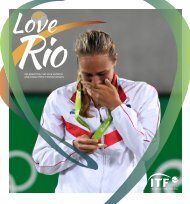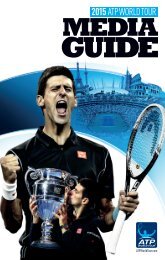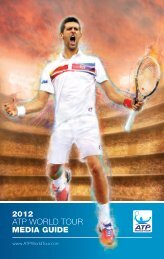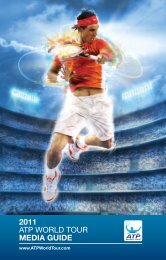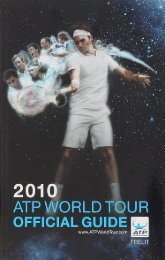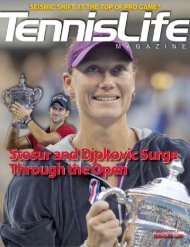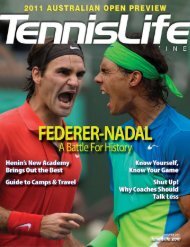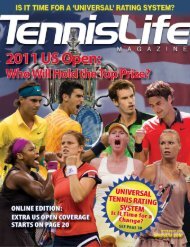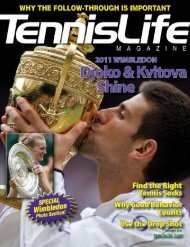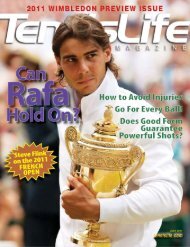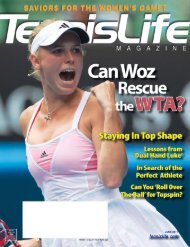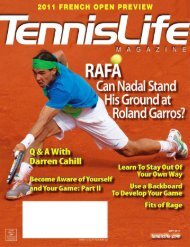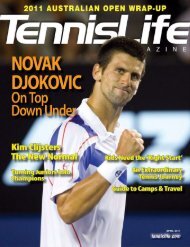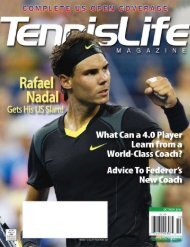A Champion's Mind - Pete Sampras
www.tennismoscow.me Insta:TENNISMOSCOW
www.tennismoscow.me Insta:TENNISMOSCOW
You also want an ePaper? Increase the reach of your titles
YUMPU automatically turns print PDFs into web optimized ePapers that Google loves.
pressure and made guys very uncomfortable. In any event, you had to respect a guy who took big risks<br />
instead of sitting back and getting pounded 6–3, 6–3 by anyone who moved better or had more consistent<br />
groundies. Paul won three singles titles, a doubles major (the Australian Open, with Christo van<br />
Rensburg), and he climbed as high as number twelve in singles.<br />
I had taken my last big strides as a player under the watchful eye of Tim, and under his tenure I grew<br />
from a boy into a man. What I needed in Paul was a companion and an adviser, an equal who understood<br />
me and my game, and who understood other players and their strengths and weaknesses. If Tim put the<br />
finishing touches on my technique (among other things), Paul focused on strategy, helping me figure out the<br />
best ways to deploy my weapons and neutralize those of my opponents.<br />
Paul was less social than Tim. He was soft-spoken and reserved, although if he knew someone well<br />
enough he loved to talk about things—and always on a pretty high, philosophical level. Paul always<br />
thought before he spoke, and he was incredibly patient. He took the high road in any conflict or<br />
controversy. We were more similar in temperament than Tim and I had been, which by that time was an<br />
asset.<br />
Paul never got the credit he deserved as my coach because of the level at which I was playing when he<br />
assumed the reins. Some people thought all Paul had to do was carry my rackets to the stringer, warm me<br />
up for matches, act as a go-between with the press, and make sure our dinner or plane reservations were<br />
in order. But I definitely needed—and got—a lot more than that from him, starting with the way he<br />
handled his role. Paul was very good at handling the media. He was both open to them and understanding<br />
of their jobs, but he wasn’t in love with the sound of his own voice, and he always downplayed his<br />
influence on me. He wasn’t a guy to pump up his own tires. Reporters liked and respected Paul, and that<br />
helped my cause with them, too.<br />
Paul knew that different people need to be handled in different ways. He could coach me, or he could<br />
coach Andre. He was a good reader of character and temperament, knowing what I needed to hear and<br />
how to say it. And that is a huge—repeat, huge—part of being a high-level coach. You have to understand<br />
a guy and work within his comfort zone, avoiding the temptation to change him or make him conform to<br />
how you want him to be—even when you know that kind of change would be beneficial. His bedside<br />
manner was great.<br />
Paul didn’t have to say a lot, although he had a lot to say; he chose his words carefully and never<br />
overcomplicated things. He was a good reader of character, and he quickly figured out that I didn’t really<br />
like to talk about my tennis a lot—I was kind of possessive about the game. He also knew that I didn’t like<br />
to make a bigger deal out of things than necessary, partly because he was like-minded in that way.<br />
It was tough for Paul to keep himself in the background while Tim was ill, for the simple reason that the<br />
press was always after him to talk, and Paul didn’t want to overshadow Tim. What might have been even<br />
harder for him was to hang back in deference to Tim when it came to coaching me. Paul had his own<br />
thoughts about my game, but he was careful to avoid conflict with Tim. He had been supremely loyal, to<br />
Tim and to me. He kept the faith.<br />
Paul was a great tactician, although I often resisted his strong emphasis on attacking tennis. That was<br />
because I took a lot of pride in my all-court abilities. Paul always wanted me to be aware of how I was<br />
losing points—not just after but during matches (which can be very difficult to do in the heat of battle). I<br />
think he believed that the awareness would lead me to play more forcefully and aggressively.<br />
Tim was great when it came to my game; Paul was great when it came to the games of guys I would<br />
have to beat. His strategic solutions to the problems various players presented were gems of perception, a<br />
remarkable combination of simple yet subtle. He would suggest or say the kind of things that might make<br />
you want to smack your forehead and think, Now why didn’t I think of that?<br />
For example, against Andre Agassi, Paul felt I should play to Andre’s forehand side—go to the<br />
forehand to open up the backhand court. In fact, that was always my key to beating Andre. But in order to



